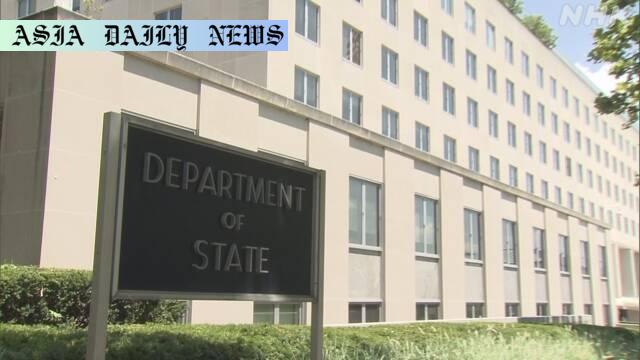Taiwan Independence – US State Department updates its stance on Taiwan, removing references to opposing Taiwanese independence.
US State Department removes a key phrase on opposing Taiwan independence.
China criticizes the move, claiming a violation of the ‘one-China’ principle.
Taiwan welcomes the update and sees it as a positive development in US-Taiwan relations.

Introduction: A Shift in US-Taiwan Relations
The United States State Department recently updated a fact sheet on its website, omitting a critical phrase: “we do not support Taiwan independence.” This adjustment, though seemingly small, has triggered significant political ripples in global diplomacy. While the US reaffirmed its commitment to the ‘one-China’ policy, the omission suggests a nuanced, evolving approach to its stance on Taiwan. This development has invited mixed reactions from various parties, particularly from China and Taiwan.
China’s Reaction: Stern Disapproval
China has expressed deep dissatisfaction with the alteration. A spokesperson from China’s Foreign Ministry, Guo Jiakun, called the update a severe violation of the ‘one-China’ principle and criticized the United States for escalating tensions. Guo emphasized that China urges the US to “correct its wrongdoings” and approach the Taiwan issue cautiously. Beijing views changes like these as threats to its sovereignty and territorial integrity, exacerbating the already tense Sino-US relations.
Taiwan’s Positive Reception
On the other hand, Taiwan welcomed this development. Taiwan’s foreign ministry perceived the update as a reflection of the close and friendly partnership it shares with the US. Foreign Minister Lin Chia-lung called it an “active stance” and praised the US for bolstering Taiwan-US relations. Lin also underscored Taiwan’s ongoing efforts to strengthen its defense capabilities alongside increased cooperation with the US and other countries with shared democratic values.
Historical Context: US-Taiwan Policy
To understand the implications of this update, it’s essential to revisit the longstanding US-Taiwan policy. The United States has maintained a complicated unofficial relationship with Taiwan under the ‘one-China’ policy since 1979. Simultaneously, the US has supported Taiwan through arms sales and other forms of cooperation without recognizing it as an independent state. This delicate balancing act is rooted in three US-China joint communiqués, the Taiwan Relations Act, and the Six Assurances, forming the backbone of US policy in the region.
Recent Trends in US-China Relations
The omission on the fact sheet aligns with escalating frictions between the US and China over various issues, including trade, human rights, and technological dominance. Taiwan has become a focal point in this rivalry. The update could signal a strategic move by the US to assert increased support for Taiwan, despite Beijing’s vehement opposition.
Implications for the Asia-Pacific Region
This latest update will likely heighten tensions in the Asia-Pacific region. China’s aggressive stance toward Taiwan has always been a source of regional instability. Meanwhile, the US’s nuanced shifts in policy could embolden Taiwan and other neighboring countries that seek to counteract China’s growing influence. The change also reinforces the need for diplomatic and military preparedness in the face of potential escalations.
Looking Forward
As the world watches closely, the move by the US could redefine the geopolitical dynamics around Taiwan. The response from key stakeholders such as the US, China, and Taiwan itself will shape the future direction of this complex issue. The global community will need to tread carefully to avoid unintended consequences while fostering peace, stability, and prosperity in the region.
Conclusion
While the update to the US fact sheet on Taiwan seems minor, its symbolic importance cannot be underestimated. This change speaks volumes about the evolving dynamics of US-China-Taiwan relations. It also highlights the necessity for constructive diplomacy in preventing regional conflicts while supporting shared democratic values.



Commentary
Significance of the US Fact Sheet Update
The US State Department’s recent update on its Taiwan fact sheet is far more than just a technical adjustment; it is a strategic move with potential ramifications for global diplomacy. This action reflects the complex balancing act the US faces in its relations with both China and Taiwan. By removing the phrase explicitly opposing Taiwan independence, the US seems to signal a subtle but important shift in its approach to Taiwan, possibly to reinforce its commitment to democratic allies amid growing tensions with Beijing.
China’s Perspective in Context
China’s vocal opposition to the update was to be expected. The ‘one-China’ principle has been a cornerstone of Beijing’s foreign and domestic policies, and any perceived deviation by other nations is met with immediate disapproval. However, this incident underscores China’s vulnerability when addressing issues of sovereignty at a time when its international relations, especially with Western powers, are under strain.
Insights on Broader Geopolitical Implications
What stands out amid this diplomatic shuffle is the focus on Taiwan’s growing prominence in the geopolitical theater. Taiwan’s forward-looking response highlights its consistent effort to deepen security ties with nations that share common values, such as freedom and democracy. The move by the US could also signal intentions to strengthen alliances in the Indo-Pacific region, counterbalancing China’s dominance.
In conclusion, while seemingly understated, this updated phrasing in the State Department’s fact sheet adds another layer of complexity to the already intricate relations between the US, China, and Taiwan. Carefully navigating these waters will be crucial to ensuring stability and fostering progress in the region.